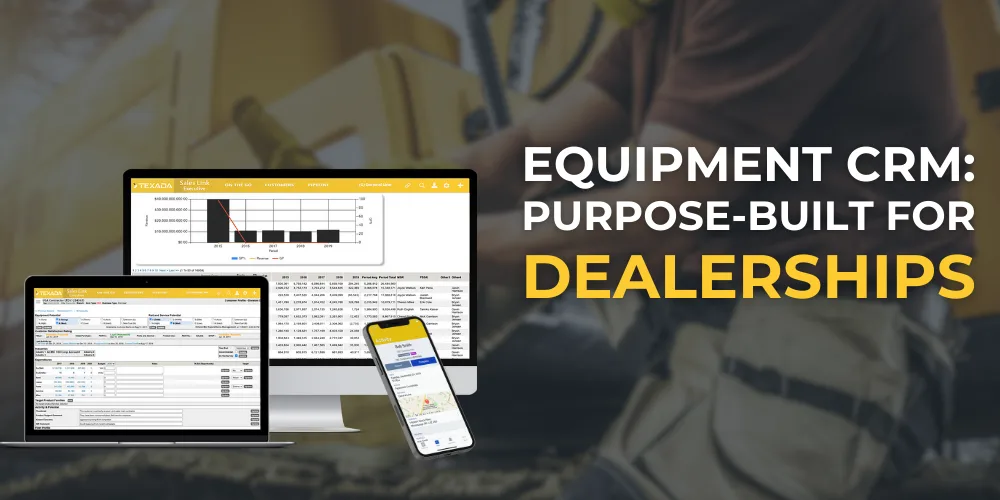Artificial intelligence (AI) can offer tremendous value to equipment business teams. Gain insights into how AI can enhance customer experiences, streamline operations, and ultimately drive business growth with three practical use cases.
Artificial intelligence (AI) has become a part of our daily lives. From recognizing speech while sending a text using a Smartphone, to asking voice assistants like Siri or Alexa to perform a web search. Navigation apps like Google or Waze leverage GPS to map the best route to our destination, while Amazon and Spotify offer us personalized recommendations, based on our previous selections. These are all examples of AI.
“Over the last eight months, there have been a lot more conversations about artificial intelligence than ever before,” said Adam Kropf, Senior Director of Product Management at Texada Software. “The biggest driver of this change is ChatGPT by a company called OpenAI.”
Evolution of Artificial Intelligence
A notable shift in AI conversations can be attributed to a groundbreaking development by OpenAI called ChatGPT.
ChatGPT marks a shift from conventional, one-way interactions with applications to more conversational, two-way engagements. The focus on conversational AI opens up accessibility to a broader audience, not just programmers, enabling more people to harness its power.
“You can actually speak to it like you would as a human,” said Kropf on the functionality of ChatGPT. “Everybody has access to this today and it gives you the ability to take in a lot more information and make better decisions than typical apps have done in the past.”
Implications for Business and Decision-Making
Artificial intelligence enhances decision-making by efficiently processing vast amounts of information. This evolution positions AI as a tool available to everyone, with the capability to make more informed decisions and recommendations than traditional applications.
“Many are wondering how AI will impact the heavy equipment space,” said Kropf. “Let’s put on our creativity hats here and think about some problems that we face every day in our operations and how AI can help us.”
While it is clear that AI has the potential to boost productivity, there are a few practical use cases that are almost immediately applicable and can positively impact the business.
Three Practical Use Cases for Artificial Intelligence (AI) in Equipment Businesses
When it comes to using AI, Kropf recommends having a creative perspective, considering everyday operational challenges and how AI. could revolutionize solutions.
“Imagine a picture of a mechanic with a robot who’s there to help out with daily work,” said Kropf. “That’s essentially the function of AI in this case.”
Kropf recommends the following three use cases to get started in using AI for daily work.
Use Case 1: Auto-Prioritize Work Orders by Urgency
By analyzing work orders and prioritizing them by urgency, technicians can address the most emergent problems first.
“What if work orders and tickets were automatically prioritized for your team by urgency?” asked Kropf. “These could be VIP customers or a certain piece of equipment that needs to be serviced because it is scheduled for rental tomorrow. This would be an example of an AI use case.”
Purpose-built equipment business solutions powered by AI are now available to deliver this functionality.
Use Case 2: Add-On or Upsell Suggestions Based on Previous Sales
Using previous purchase behaviors linked to individual customers’ accounts or the behaviors of similar customers, automated systems can recommend suitable add-on purchases.
“For example, what if your sales reps were given relevant information about what’s on a rental quote or a sales quote,” said Kropf. “Sales could receive automatic recommendations based on a customer’s previous behavior, or similar customers’ purchase history. I like to call it: Do You Want Fries With That? But on steroids, because obviously it’s not just the fries, these are personalized recommendations much like what Amazon does today.”
A benefit to sales teams, this feature can ensure that required accessories are included in an order, recommend enhancements or additional helpful services, and otherwise boost an organization’s sales.
Use Case 3: Rate Adjustments and Seasonality
Rental rates adjustments can be set up to occur based on utilization and seasonality for optimal return on investment, year round.
“What if your rental rates were automatically adjusted based on the time of year you are?” asked Kropf. “Obviously you’re not going to be getting a lot of money for heat equipment if you’re in a warmer climate or if you’re in the summertime of a colder climate. But in the winter time, as your utilization gets up over 80 or 90 percent, what if it automatically adjusted those rates for any new bookings so you can maximize your opportunity? Then, when it’s in the slower times where you’re like shoulder seasons, you actually reduce the rate a little bit to make sure you get maximum fleet delineation.”
By taking advantage of increased demand, businesses can maximize the influence of seasonality on their rate structure automatically.
Move Forward with Artificial Intelligence
There are many ways that AI can benefit equipment dealerships and rental business teams. Ready to learn more? Download the full AI for Equipment Business Teams White Paper today and get seven AI use cases that your team can apply to streamline your workflow, finish tasks faster, and work more seamlessly.
Plus, learn about ways that other parts of the business may be using AI for customer communications, marketing, finance, and more.





